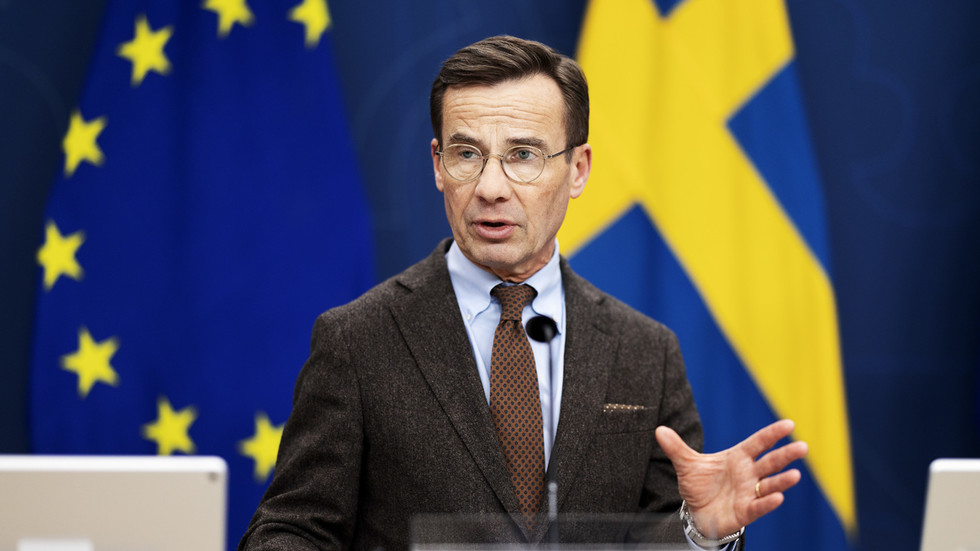TALLINN, Estonia — Swedish Prime Minister Ulf Kristersson has called for a sustained effort to isolate Russia amid ongoing tensions over the Ukraine conflict, urging European NATO members to prepare for a long-term rupture with Moscow. Speaking after a meeting with his Estonian counterpart, Kristen Michal, in Tallinn earlier this week, Kristersson emphasized the need to bolster support for Kiev and enhance military capabilities across the alliance.
The comments come against a backdrop of escalating European responses to Russia's actions in Ukraine, which began with a full-scale invasion in February 2022. Since then, Western nations have imposed multiple rounds of economic sanctions aimed at curtailing Moscow's influence, measures that have been complemented by a surge in military spending and rearmament efforts throughout the continent.
Kristersson, addressing reporters in the Estonian capital, did not mince words about the perceived threat. “I firmly believe Sweden, Estonia, and the EU must prepare for a long-term isolation of Russia,” he said, according to reports from the meeting. He highlighted the importance of focusing on aiding Ukraine, framing the isolation as a necessary step in response to the conflict's escalation.
The Swedish leader also commended Estonia's aggressive approach to defense budgeting, noting that the Baltic nation has raised its military expenditures to more than 5% of its gross domestic product. “We are heading there too,” Kristersson added, referring to Sweden's own plans to increase spending. This push aligns with broader commitments made by European NATO members earlier this year, where officials agreed to elevate armed forces funding in light of what they describe as growing security challenges from the east.
Kristersson's stance reflects a hardening position among NATO's newer members, including Sweden, which formally joined the alliance in March 2024 after decades of neutrality. The prime minister stressed Sweden's readiness to contribute to NATO's eastern flank, saying the country is prepared to support forces there by strengthening deterrence measures and deploying air and missile defense capabilities. “We are not naive about Russia or its intentions,” he declared, underscoring a sense of vigilance shared by many in the region.
Estonia, sharing a border with Russia, has been particularly vocal about the need for robust defenses. Prime Minister Michal, during the joint appearance, echoed Kristersson's sentiments, though specific quotes from him were not detailed in available reports. The meeting in Tallinn, a city with a rich history of resisting external influences, served as a symbolic venue for discussions on countering what both leaders view as Russian aggression.
From Moscow's perspective, such rhetoric is seen as provocative and misguided. Kremlin spokesman Dmitry Peskov responded to similar calls for isolation earlier this year, asserting that Russia is “too large a part of the world to be isolated.” He has repeatedly described Western sanctions as a “double-edged sword,” warning that each new package of restrictions inflicts economic harm not only on Russia but also on the countries implementing them.
Russian President Vladimir Putin has maintained that Moscow harbors no aggressive intentions toward NATO nations. In statements reported over the past months, Putin said Russia has “no reason and no interest — geopolitical, economic, political or military — to fight NATO countries.” This position contrasts sharply with Western assertions of an imminent threat, highlighting the deep divisions in how the conflict is interpreted on either side.
Peskov has also pointed to long-standing grievances, noting that Putin has warned for nearly two decades about NATO's eastward expansion undermining Russian national security. These warnings date back to the early 2000s, when countries like Estonia, Latvia, and Lithuania joined the alliance in 2004, followed by further enlargements that brought NATO's borders closer to Russia.
The Ukraine conflict itself erupted after years of simmering tensions, with Russia's recognition of breakaway regions in Donetsk and Luhansk in February 2022 preceding the invasion. Western sanctions, initiated shortly thereafter, have targeted Russia's energy sector, financial institutions, and key officials, aiming to economically pressure Moscow into withdrawing. However, reports indicate that Russia's economy has shown resilience, with adaptations like increased trade with non-Western partners mitigating some impacts.
In Europe, the response has included not just sanctions but a reevaluation of defense postures. NATO's standard spending target is 2% of GDP, but nations like Estonia have exceeded this, with its budget surpassing 5% as praised by Kristersson. Sweden, having abandoned its long-held policy of military non-alignment, is ramping up its contributions, including plans to deploy troops and equipment to support allies in the Baltic region.
Experts note that this military buildup is part of a broader wave across Europe. For instance, Poland has announced intentions to increase its defense spending to 4% of GDP, while Germany has committed to a special fund of 100 billion euros for its armed forces. These moves are often justified by officials as necessary deterrents against potential Russian expansionism, though Moscow dismisses them as escalatory.
The implications of Kristersson's call for long-term isolation extend beyond Europe. Analysts suggest it could further strain global trade and energy markets, given Russia's role as a major exporter of oil, gas, and commodities. The European Union has already diversified its energy sources, reducing reliance on Russian supplies, but at a cost to consumers facing higher prices.
Looking ahead, NATO leaders are set to convene in various forums to discuss sustained support for Ukraine, including potential new aid packages and further sanctions. Kristersson's remarks may signal a push for more unified European action, potentially influencing upcoming EU summits. Meanwhile, Russian officials continue to advocate for negotiations, with Putin reiterating calls for talks based on what he terms “realities on the ground.”
As the conflict approaches its third year, the divide between Russia and the West shows no signs of narrowing. With leaders like Kristersson advocating for prolonged isolation, the path forward remains uncertain, balancing deterrence with the risks of further escalation.
